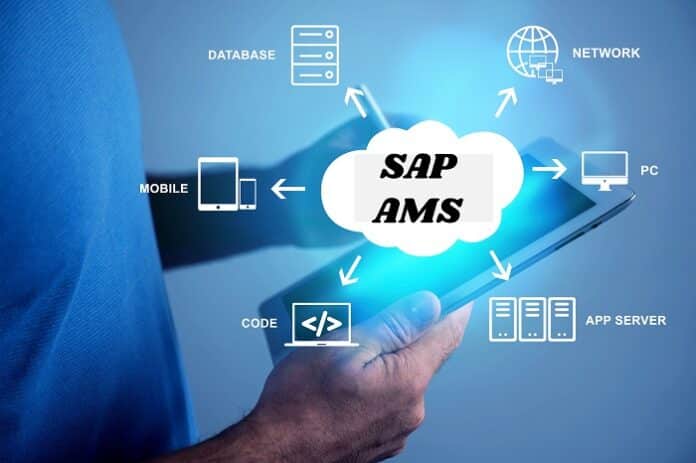In the current competitive business landscape, leveraging technology effectively is crucial to driving expansion and efficiency. Solutions from SAP (Systems, Applications, and Products in Data Processing) are renowned for their ability to boost output, streamline procedures, and provide insightful data. It can be difficult to maintain and manage these intricate systems, though. This is where SAP Application Management Services (AMS) come into play. With a wide range of upkeep, improvement, and support services, SAP AMS helps companies make the most of their SAP solution investments.
Understanding SAP AMS
Ensuring the seamless operation and ongoing enhancement of SAP applications is the aim of SAP AMS. Among these services are monitoring, issue resolution, performance optimization, system enhancements, and incident management. Companies can assign an AMS provider to handle the daily management of their SAP systems, freeing up internal staff to focus on strategic initiatives.
Key Benefits of SAP AMS
Cost Efficiency
The cost-effectiveness of SAP AMS is one of its main advantages. Maintaining an internal workforce to manage SAP systems may be expensive because it necessitates significant expenditures for infrastructure, salaries, and training. AMS providers are a more affordable option since they provide clients with access to a pool of skilled professionals that can efficiently manage and optimize SAP systems.
Expertise and Knowledge
Providers of SAP AMS contribute a plethora of experience and knowledge. They are well knowledgeable with industry standards, best practices, and SAP systems. Their expertise allows them to ensure compliance with legal requirements, identify and resolve issues quickly, and carry out organizational changes. Businesses may maximize their SAP investment and make well-informed decisions by utilizing the skills of AMS consultants.
Proactive Monitoring and Maintenance
Advanced monitoring tools and strategies are employed by SAP AMS suppliers to proactively detect possible problems before they have an influence on business operations. They can identify abnormalities, remove performance bottlenecks, and avoid downtime by routinely monitoring system performance. To maintain the system secure and up to date, routine maintenance tasks including installing patches and updates are also completed. Businesses may avoid expensive disruptions and guarantee the seamless operation of their SAP applications by using proactive monitoring and maintenance.
Scalability and Flexibility
Businesses’ needs for SAP may alter as they expand and develop. Scalability and flexibility are provided by SAP AMS providers to meet these evolving needs. When it comes to meeting the needs of their clients, AMS suppliers might grow their offerings to accommodate more users, add more modules, or improve system functionality. This guarantees that companies won’t have to worry about SAP system constraints as they may take advantage of new prospects and adjust to market demands.
Continuous Improvement
SAP AMS aims for continual development rather than merely upholding the status quo. AMS providers work directly with businesses to identify areas for improvement and implement strategies to optimize system performance. This entails optimizing procedures, adjusting configurations, and utilizing recently released features and functionalities. Businesses may maintain a competitive edge, foster innovation, and maximize their SAP investment by consistently enhancing their SAP systems.
Focus on Core Business
The management of SAP applications can be time-consuming and resource-intensive, diverting attention from crucial business responsibilities. Businesses can focus on their core strengths and free up key internal resources by outsourcing SAP AMS. This allows businesses to grow without being limited by the complex minutiae of SAP system management, achieve their strategic goals, and increase customer satisfaction.
Choosing the Right SAP AMS Provider
Selecting the right SAP AMS supplier is crucial if you want to get the most out of your SAP system and get the most return on your investment. When selecting an AMS provider, keep the following points in mind:
Experience and Expertise
Seek out an AMS supplier with a strong track record and a wealth of SAP system management expertise. They must be well knowledgeable about SAP technologies, industry-specific specifications, and best practices. Look for an AMS provider with a proven track record and a plethora of knowledge regarding SAP system administration.
Service Offerings
Analyse the services that the AMS supplier offers. Check to see whether they can handle any unique requirements you may have, such as performance optimization, monitoring, incident handling, and system updates. Ensuring that every facet of SAP system management is addressed is ensured by a complete array of services.
Scalability and Flexibility
Take into account the AMS provider’s flexibility and scalability. As your company’s demands evolve, it’s critical to select a provider who can adjust to meet those changing requirements. Evaluate their capacity to accommodate more users, integrate new modules, and scale services.
Proactive Approach
Seek out an AMS supplier that approaches system management pro-actively. To reduce interruptions, they ought to employ sophisticated monitoring instruments, carry out routine upkeep, and put preventive measures in place. Proactive providers make sure problems are fixed before they affect how businesses operate.
Support and Availability
Assess the AMS provider’s availability and level of assistance. Make sure they have a strong incident management procedure in place and provide support around the clock. Maintaining the seamless operation of SAP apps depends on prompt issue resolution and reaction.
Cost-Effectiveness
Think about how affordable the AMS provider is. Compare pricing structures, contract lengths, and service level agreements to make sure you’re getting the most out of your investment. Prioritize quality and experience over cost if you want to get the most out of SAP AMS.
Conclusion
To maximize the return on investment made in SAP systems, SAP AMS is required. Businesses can overcome obstacles and promote continuous development by utilizing automation, technical assistance, and best practices with the aid of AMS suppliers. With the help of SAP AMS’s advantages—cost-effectiveness, knowledge, proactive monitoring, scalability, and a focus on core business—organizations can get the most out of their SAP investment. Consider an AMS supplier’s experience, service offerings, scalability, proactive attitude, cost, and support before making your decision. Businesses may accomplish their strategic goals and fully exploit the potential of SAP systems by partnering with the appropriate AMS supplier.





